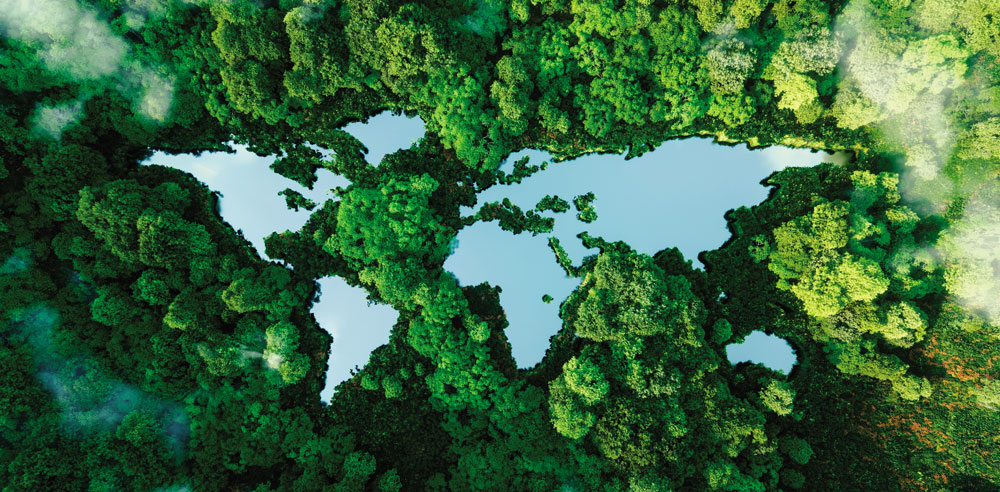



Southeast Asia leads the way
December, 2021 in Issue 4 – 2021, Environment
In March 2021, the World Resources Institute (WRI), a global research non-profit organisation operating since 1982, issued its annual ‘Global Forest Review’. They found that 12.2 million ha of tree cover was lost in 2020 – a 12% increase from 2019.
Sadly, nearly one-third of that loss occurred within tropical primary forests which are crucial to storing carbon and maintaining biodiversity – these are among the world’s best chances of mitigating climate change.
For the second year in a row, Brazil topped the list of nations that experienced staggering primary forest loss. The country lost nearly 1.7 million ha to fires and clear-cutting. Not only was this loss a 25% increase from 2019, but it was also three times higher than the second country on the list: the Democratic Republic of Congo.
Although most of the primary forest loss in Brazil occurred in the Amazon, the Pantanal – the world’s largest tropical wetlands – experienced 16 times more primary forest loss, as land was cleared for development projects, agriculture and cattle pastures.
The WRI data, provided by scientists at the Global Land Analysis and Discovery laboratory at the University of Maryland in the US, clearly denotes that key targets were missed in 2020 and that deforestation rates are climbing to new highs. Now, more than ever, we must reimagine our policies and economies in a way that protects forests.
Against this backdrop, though, the declining national deforestation rate in Southeast Asian nations like Malaysia and Indonesia provided a rare glimpse of hope for the world’s forests.
While Brazil’s deforestation increased dramatically, Malaysia’s forest loss was reduced – its rate fell from sixth-highest on the list to ninth in just one year. This was the steepest drop registered by any nation on the list, and followed a trend that Malaysia has been setting for four years.
According to the report, government actions are in part to be credited for this downward trend. In 2019, Malaysia began a five-year cap on plantations, as well as increased the fines and jail terms for illegal logging, in accordance with stringent adherence to forestry laws.
Corporate commitments from the pulp, paper and palm oil sectors also played a substantial part in the rollback of forest loss. Currently, 83% of palm oil refining capacity in Malaysia and Indonesia come under the No Deforestation, No Peat and No Exploitation commitments, all of which have helped the producer nations decrease deforestation.
The progress in Malaysia has also specifically coincided with the implementation of the Malaysian Sustainable Palm Oil (MSPO) certification scheme. Under this programme, a moratorium on oil palm expansion has been enforced to protect 50% of forest cover, while ensuring that all palm oil is 100% sustainable.
In this context, disinformation that discredits palm oil, or policy-decisions like that of the EU – to phase palm oil out of the bloc’s biofuels market by 2030 – must be rejected, especially as they appear to overlook the progress and efforts that developing nations like Malaysia have put into keeping forests healthy and commodity-production sustainable.

Blanket restrictions unacceptable
Only a few days before the WRI report was launched, researchers from the Chalmers University of Technology in Sweden and the University of Louvain in Belgium conducted a robust analysis of more than a thousand proposals on curbing imported deforestation.
These proposals originated from open consultations and workshops, where the EU gathered ideas from companies, interest groups and think tanks, to put together the most potent and politically feasible policy framework that can effectively address issues of imported deforestation.
The findings of the study, titled ‘Eighty-Six EU Policy Options for Reducing Imported Deforestation’, cautioned against imposing blanket restrictions on commodities. Instead, the researchers recommended that importers be held accountable and responsible by requiring them to carry out and prove due diligence throughout the product’s supply chain.
The study also encouraged conducting multi-stakeholder forums, which includes companies, politicians and civil society groups, for decision making pertinent to the removal of a supply chain, commodity or area of deforestation. Including more affected parties would lead to wider acceptance of policies.
The researchers also proposed measures to balance the trade-off between the proposed policy’s effect and its feasibility. For instance, they recommended pairing trade regulations – that tend to hit poorest countries the hardest – with provision of aid, so that nations can pursue sustainable production.

This could also help reduce the risk of unsustainably produced goods being exported to regions other than the EU. For instance, China, which is the world’s second-largest palm oil importer, recently gave investors access to the palm oil trade with no stipulations for sustainability. This is dangerous and will result in creating what is known as a ‘leakage market’, which could end up derailing efforts like the MSPO.
The reality of our food cycle is that the world is highly dependent on palm oil. It contributes, for example, to the diet of half of humanity and provides a livelihood for millions of smallholder farmers.
The oil palm is the most efficient of vegetable oil crops – yielding the most oil while using the least amount of land. This is why it is important to work with palm oil producers to balance growing demand with innovation that safeguards the natural world.
But we must acknowledge existing flaws. While Southeast Asian states have raised hopes in the fight against deforestation, the global trend paints a grim picture. Total carbon emissions resulting from forest loss in 2020 alone equaled 2.64 Gt – equivalent to the annual emission of 570 million cars, more than double the number of vehicles currently on US roads.
These realities are a stark reminder that efforts by Malaysia and Indonesia, while commendable, will only succeed when the comity of nations comes together. National policies will continue to have the most impact on forests – but, without global cooperation, the impact may remain limited in the face of climate change.
The Centre for Palm Oil Studies
This is an edited version of the article available at: https://thecspo.org/southeast-asian-countries-provide-hope-for-global-forests-world-resources-institute/